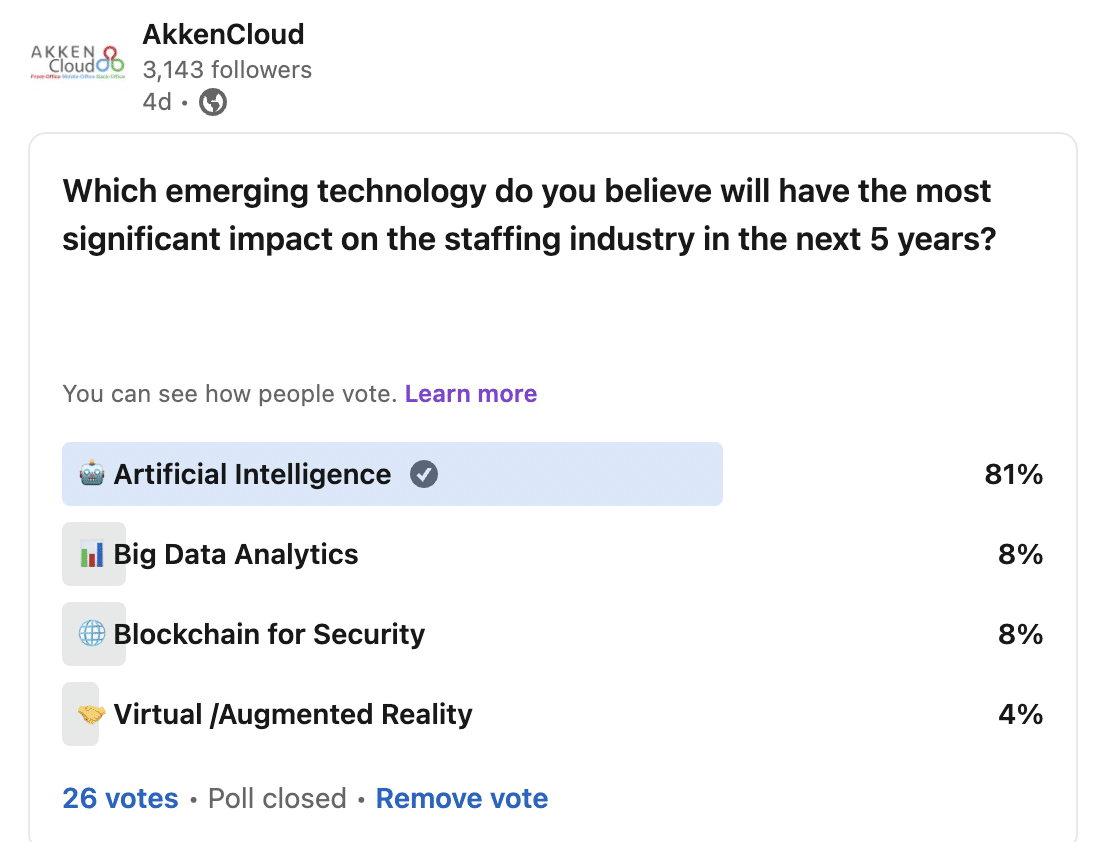The intertwining of Artificial Intelligence (AI) with the future of the staffing industry marks a transformative era poised to redefine talent acquisition and operational efficiencies. A recent LinkedIn poll among industry professionals underscored this shift, with an overwhelming 81% identifying AI as the technological force expected to wield the most significant impact in the coming years. This consensus isn’t merely an observation; it’s a clarion call for us at AkkenCloud to dive further into and innovate within the realms of AI, aiming to leverage its potential for the benefit of our agency and the clients we serve.
Such a compelling directive propels us toward exploring new frontiers in AI application, underscoring the imperative to integrate intelligent systems into our operational fabric. The journey ahead is about adopting AI technologies and fundamentally transforming how staffing services are delivered and experienced. At AkkenCloud, we’re committed to harnessing AI’s transformative power, optimizing our processes, and pioneering strategies that ensure our agency and clients are positioned at the forefront of industry innovation and growth.

1. Enhanced Candidate Matching
AI isn’t just changing the game; it’s creating a new one. Traditional candidate matching often involves sifting through resumes, a process that is as time-consuming as it is prone to oversight. AI revolutionizes this by employing complex algorithms that scan, sort, and match candidates with unparalleled accuracy and efficiency. Imagine a system that understands the requirements of a job listing and the subtle nuances in a candidate’s experience that make them the perfect fit. This match-making prowess ensures that the best talent doesn’t slip through the cracks, significantly improving placement success rates and client satisfaction.
Moreover, the dynamic nature of AI means it continually learns from each match, becoming more adept over time. This iterative learning process enables the system to adapt to changing job market trends and the evolving needs of candidates and employers. By integrating AI-driven candidate matching, staffing agencies can offer a more personalized and efficient service, setting themselves apart in a competitive market.
2. Automated Resume Screening
The resume screening process can often feel like searching for a needle in a haystack. AI simplifies this by automating the initial screening process, quickly identifying the most promising candidates from a large applicant pool. This automation goes beyond keyword matching; it involves deeply understanding job descriptions and their required qualifications. By analyzing resumes at scale, AI can highlight candidates who meet the basic requirements and possess the potential for growth and success within the role.
However, the benefits of AI in resume screening extend beyond efficiency. We promote a more diverse and inclusive workforce by removing the initial human bias from the screening process. AI treats each resume impartially, focusing solely on skills and experience. This objectivity is crucial in building a more equitable job market, ensuring opportunities are based on merit, not background or personal connections.
3. Predictive Analytics for Talent Sourcing
In the realm of staffing, foresight is as valuable as insight. Predictive analytics is one of AI’s most compelling applications, allowing us to anticipate future staffing needs and talent shortages. By analyzing historical data, market trends, and social signals, AI can forecast demand for specific skill sets, predict which roles will be challenging to fill, and identify the best recruitment times. This proactive approach to talent sourcing means we’re not just reacting to the market but staying one step ahead.
Equally important is AI’s ability to identify passive candidates who are open to new opportunities before they actively start looking. This capability ensures that staffing agencies can build a robust talent pipeline, ready to promptly meet their clients’ needs. In a market where timing is everything, the ability to predict and prepare for future demands is a game-changer.
4. Chatbots for Candidate Engagement
First impressions matter; in the digital age, many first interactions happen online. AI-powered chatbots offer a way to engage candidates the moment they show interest, providing immediate responses to inquiries and guiding them through the initial stages of the application process. This 24/7 availability ensures that candidates feel valued and supported, improving their experience and perception of the agency.
But chatbots do more than answer questions; they’re an extension of your brand’s voice and values. Customizable to reflect your agency’s tone and style, they offer a personalized interaction that can significantly enhance the candidate journey. By automating the initial engagement, staffing agencies can allocate human resources more effectively, focusing on customized interactions where they’re most needed.
5. Intelligent CRM Systems
At its core, staffing is about building relationships, and AI-enhanced CRM systems are revolutionizing how we manage these connections. By integrating AI, CRMs can automatically update client and candidate information, track interactions, and provide actionable insights to improve service delivery. This level of automation and insight ensures that every communication is informed and tailored, fostering more muscular, meaningful relationships.
Moreover, AI-driven CRMs can predict client needs based on past interactions and market trends, enabling staffing agencies to anticipate requests and offer solutions proactively. This forward-thinking approach enhances client satisfaction and positions your agency as a strategic partner invested in your client’s long-term success.

